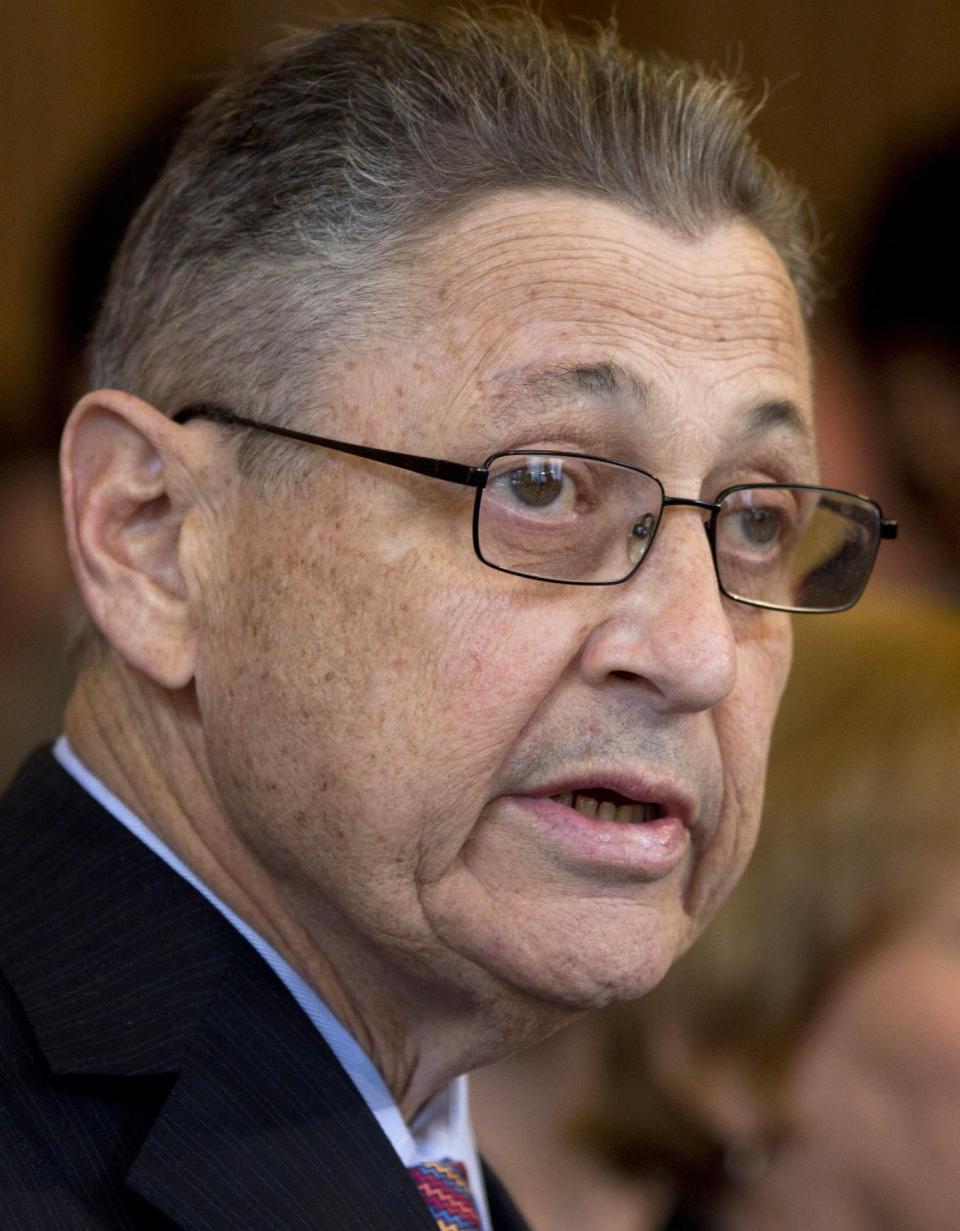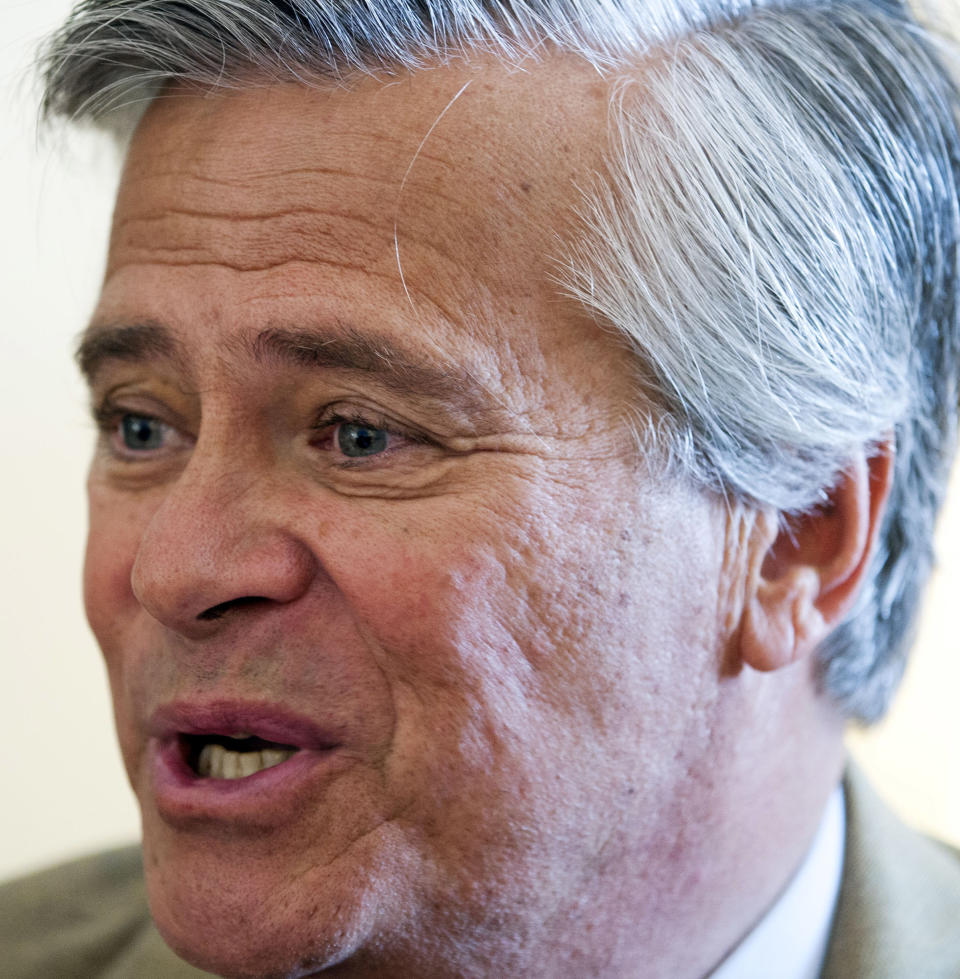AP: NY lawmakers invest to pad campaign accounts
ALBANY, N.Y. (AP) — Two of New York's most powerful lawmakers have bolstered their massive campaign accounts by investing millions of those dollars in municipal bonds and companies, some of which have business before the state and have made campaign donations to the legislative leaders.
Democratic Assembly Speaker Sheldon Silver has collected $41,571 in dividends and interest in the past six months from the more than $2 million his campaign has invested in 100 companies through mutual funds, according to elections disclosures reviewed by The Associated Press. Republican Senate Majority Leader Dean Skelos has more than $700,000 in investments in bonds as part of $2 million in investments, a fund built up over 20 years, according to a list provided to the AP by his campaign.
Both campaigns note that the investments are legal and neither leader has been accused of a conflict of interest. The campaigns for Silver and Skelos say the lawmakers have no input in how the funds are invested.
Sharing political wealth is one of the key roles of legislative leaders, who continue to amass campaign funds even though they have little or no need for the money to retain their seats. It's also a way they solidify power in chambers they run with near complete control: With big bank accounts, they spread the largesse around to endangered or underfunded colleagues, who in turn select a leader for their members every two years.
Investing campaign money is not prohibited by state or federal law, but the practice is rare because of the appearance of conflict of interest, other ethics concerns and because politicians who do it have to be so deeply entrenched that they can spare money to invest.
While law requires elected officials to disclose all the companies where they make their personal investments, their campaigns are not required to give detailed disclosure — only the sum they reap in returns. This has raised concerns among government watchdog groups who say powerful incumbents are already protected in myriad ways.
"There is certainly potential for abuse," said Bill Mahoney of the New York Public Interest Research Group.
The Federal Election Commission said as far back as 1999 that investing campaign funds in the stock market, often in blue chip stocks with substantial public business, is legal. A federal law enacted this year makes members of Congress and their staff subject to insider trading laws after senators and their staff beat market returns by 6 percent and House members and staff beat the market by 12 percent, said Craig Holman of the government watchdog group Public Citizen.
He sees parallels in New York.
"It's the same insider trading," Holman said. "An officeholder is privy to inside information, especially if they are going to introduce legislation that could impact an industry."
Nationally, the discussion about campaign financing has centered on the Supreme Court's decision in the Citizens United case to uphold limitless political donations from corporations. But that's largely been a debate about where campaign cash comes from, not what's done with it.
Counting the investments, Silver, from Manhattan, nearly doubled the $2.8 million in campaign cash he reported in this month's state Board of Elections filings. Campaign finance records show the investments include companies that have state contracts, lobby lawmakers on legislation, are headquartered in New York and pay taxes, have charities regulated by the state, or are regulated by the state. Most also make campaign contributions. They include Verizon Communications, IBM Corp., General Electric Co., PepsiCo Inc., Abbott Laboratories, Goldman Sachs, JPMorganChase, and Bank of America.
Verizon's "Good Government Club" contributed $2,500 to Silver in 2008. JPMorganChase, which handles many of his campaign's investments, is a regular contributor with $5,000 in direct contributions in 2008-09, and Silver received $5,000 from GE in 2006-10.
In the Senate, Skelos' campaign says $717,319 is invested, adding to the $2.1 million reported in campaign records. The investments are in bonds purchased in borrowing by local governments, school districts, hospitals, libraries and public works, according to a list the campaign provided to The Associated Press. State records show the campaign received revenue in the form of 14 dividends and interest payments from investments through the investing firm of UBS Financial Services, based in Melville, part of Skelos' Long Island district. The Republican reported just $80 in revenue in the last six months.
"Senator Skelos has no involvement whatsoever in selecting where these moneys are invested," said Skelos spokesman Scott Reif. "The municipalities are solely selected by the fund itself."
Records show neither the campaign's investing firm nor its top two officers contributed to Skelos.
There is no way to search for which or how many campaigns hold investments, according to the board of elections, but few campaigns have enough reserves to commit to long-term investments. The National Conference of State Legislatures hasn't heard of or tracked the practice in other states. Most candidates are like New York state Comptroller Thomas DiNapoli, who received just $22 in revenue in the last six months, for interest from a Capital One interest-bearing savings account.
Gov. Andrew Cuomo's staff said he does not invest campaign funds in companies. After he won the attorney general's job in 2006, he was one of many politicians who invested in campaign money in hedge funds, netting a 20 percent return on $750,000 in donations.
Silver, first elected to the Assembly in 1976 and the speaker since 1994, already had the largest campaign fund going into the fall elections.
"The speaker is not personally involved in investment decisions made by the committee," said campaign spokesman Jonathan Rosen. "An outside advisory firm handles all investment decisions."
His campaign, "out of a commitment to transparency," recently sought guidance from the state Board of Elections and chose to identify each investment, rather than just the investment firm it hired, Rosen said.
The elections board requires stocks and other investments to be disclosed when they are purchased as part of an attachment to a filing. The purchase isn't reported as a "disbursement," nor is a return of the principal termed "revenue." Income is noted in the little viewed Schedule E, which identifies dividends and interest received by the campaign, and losses are termed "campaign expenses," making tracking or even identifying investments difficult.
There is no running list of investments by campaigns, and the purchase of stock by a campaign is only reported on an attachment sent to the Board of Elections but not posted online, according to the board.
NYPIRG's Mahoney said some bills have proposed that politicians use the funds raised during the campaign cycle and either return or donate the balance to charity. That could level the playing field in Albany, where incumbents benefit from the advantages of office and enjoy a better than 90 percent rate of re-election.
"There's no reason for some politicians to get a running head start on the next election," Mahoney said.



